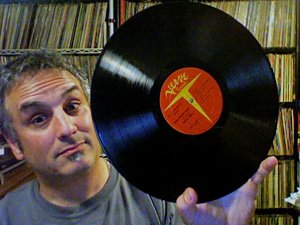It’s the time of year for saving money!
So here’s the dealio, folks: If you aren’t familiar with the album called Drums and Wires by England’s XTC, you really should take the time to get to know it. If you like British rock, you need to know this. If you like progressive rock, you need to know this. If you like so called “New Wave” and even punk rock, you need to know this album.
 If you already are a fan, then be prepared to fall in love with Drums and Wires all over again
If you already are a fan, then be prepared to fall in love with Drums and Wires all over again
Beyond this new version of Drums and Wires being fun, sounding great and containing much wonderful music, the album has also been quite influential on the rest of the world of music, a point not often acknowledged, but discussed in the accompanying booklet within the set.
Released in 1979, this was the album which put Swindon, England’s XTC on the global music map and set the stage for their ascension to the upper echelons of respected British rock royalty. The thing many of us didn’t realize at the time was that this album was also the proving ground for a new sound that would become pretty much ubiquitous in the first half of the 1980s. True to the album’s title, the overarching sonic palate for Drums and Wires is all about a really big drum sound and super-punchy guitars.
This deluxe edition reissue of Drums and Wires, out now from Ape House, Partridge’s label, contains a really interesting backstory involving how the band selected producer Steve Lillywhite for this album. It’s Lillywhite who was first able to capture the vision of lead guitarist and primary songwriter Andy Partridge and get it onto tape.
I purchased the Blu-ray edition of the set, so mine came with a CD featuring the new stereo remix and a Blu-ray Disc containing that and much much more in uncompressed high resolution audio sound. Because I ordered mine from UK’s progressive music website Burning Shed, I also received a special bonus Drums and Wires promotional postcard autographed by Andy Partridge himself!
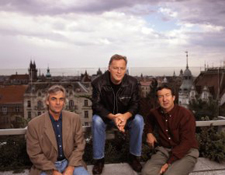 Anyhow, I’ll save some discussion of how a band like XTC cross-pollinated with the prog rock world and ultimately got involved with producer Steven Wilson (who is driving this reissue series) for later. For now, I’ll get into some nuts’n’bolts of what these mixes sound like.
Anyhow, I’ll save some discussion of how a band like XTC cross-pollinated with the prog rock world and ultimately got involved with producer Steven Wilson (who is driving this reissue series) for later. For now, I’ll get into some nuts’n’bolts of what these mixes sound like.
Because a number of readers have in the recent past commented on my overwhelming passion for the 5.1 mixes and tendency to overlook the stereo mixes, I’ll spend some time here on the stereo mixes first.
For the purposes of this review I compared select tracks on the new edition to like-tracks on:
A) A first-press UK copy on LP
B) A promo US pressing on LP
C) A stock US CD on Geffen Records.
Here are some nitty gritty observations:
The UK LP, an “A1/B1” first-press, is overall brighter and quieter volume-wise than the US promo pressing, which was a bit thicker-sounding and (seemingly) has a bit more reverb on it. When I turned up the volume during “Making Plans For Nigel,” the UK pressing sounded pretty huge, with a very crisp high end. The Geffen CD actually faired remarkably well all things considered (I mean, it is a CD after all), with a bright but not overly harsh flavor and a remarkable amount of bass. The overall mix on the CD sounded more like the UK LP than the US LP, however. Curiously, “Life Begins at the Hop” sounds thinner on the CD than on the US LP, and a even a tad faster, so I am guessing that a mix originally intended for a single was used for the CD. (Producers commonly speed up the sound on singles to make them sound more lively.)
The sound on the new 2014 stereo CD falls somewhere between them all. It’s somewhat bigger and bolder than the UK LP, but with more of the bass and midrange warmth of the US edition. Overall, the new stereo CD keeps mostly true to the sound of Steve Lillywhite’s original production vision.
Decidedly, it all sounds like Drums and Wires … just presented with quite a bit more clarity.
Now, put all that detail aside as I have to report that the uncompressed flat transfer of the original LP mix on the Blu-ray sounds positively huge. It always was a great recording and now you can hear different details on this 96 kHz / 24-bit version. For example, I noticed a little percussive bottle sound in one channel on the verses after the first chorus of “Making Plans For Nigel,” which I’ve never noticed before.
It sounds like someone is bonking a tuned plastic soda bottle in time: Ba Ba Ba-Ba-Ba. You hardly notice it on the US LP, but it’s all there for sure.
On the Blu-ray, the new stereo mix sounds as warm and inviting as the original, but with a bit more of that extra something afforded by the increased resolution which ultimately reveals new detail. It is very much true to the original mix, but with a somewhat tighter focus on Colin Moulding’s bass. Yet this leaves plenty of room for Dave Gregory’s essential chunky rhythmic guitar work, which counters Andy’s funky punctuation. All the instruments punch out really nicely now, and that says something since the mixes were plenty punchy before.
]]>Now, on to the Drums and Wires 5.1 mix. Tthis is the point where you realize that XTC were really a progressive rock band in a new wave/punk band’s clothing and mindset. These guys could play right up there with the finest of the proggers, so in retrospect it’s kinda not surprising that some of the folks from this era got swept away by the prog innovators looking to reinvent themselves for the new decade ahead and avoid becoming dinosaurs.
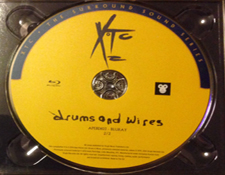 I mean, consider just some of these examples off the top of my head from the crossroads where the late ’70s head-butted the early ’80s:
I mean, consider just some of these examples off the top of my head from the crossroads where the late ’70s head-butted the early ’80s:
• King Crimson’s Robert Fripp nicked away XTC keyboardist Barry Andrews for the League of Gentlemen (arguably the first official punk/prog rock hybrid band), an act which arguably led to the rethink on XTC’s sound to forego keyboards and feature dueling guitars on Drums and Wires.
• The band led by Bruce Wooley, co-writer of the Buggles’ hit “Video Killed the Radio Star,” apparently opened for XTC on the tour for Drums and Wires. That band included a young Thomas Dolby, whose debut album Andy performed on. Yes recruited the Buggles — vocalist Trevor Horn and keyboardist Geoff Downes — for their 1980 Drama album.
• Japan singer David Sylvian would later also work with Fripp while Japan’s keyboardist Richard Barbieri would later join Porcupine Tree with Steven Wilson (who produced this reissue including the remixes and remasters).
I’m sure if we were to dig deeper we’d find more co-mingling between the olde guarde proggers and the New Wave. Here, thus, we connect dots which lead us to the point where we find our new wavy punk pop heroes XTC being today produced and reinvented by one of the saviors of modern-day progressive rock.
It’s more fun to play two degrees of Robert Fripp than two degrees of Kevin Bacon, ain’t it?
Anyhow, the 5.1 mix on Drums and Wires is wonderful, revealing just how beautifully layered this recording really is, and bringing many fine details out into the room in a very enjoyable — and non-gimmicky — manner. While there are definitely some fun moments of creative use of the surrounds, for the most part the mix is delivered via a front soundstage which ever so gently edges the band out into the room a bit. This is one of those great-sounding 5.1 mixes in that when you turn it up there is lots of analog warmth in there, one of the benefits of a full 96 kHz / 24-bit surround-sound mix.
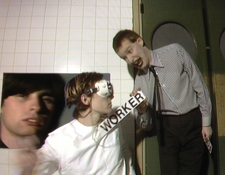 It’s an immersive mix with lots of fun touches that bring you inside the music of Drums and Wires in a way I, frankly, couldn’t have previously imagined. Kudos to producer Steven Wilson for having that vision. Most importantly, it sounds like Drums & Wires but with a whole lot more perspective.
It’s an immersive mix with lots of fun touches that bring you inside the music of Drums and Wires in a way I, frankly, couldn’t have previously imagined. Kudos to producer Steven Wilson for having that vision. Most importantly, it sounds like Drums & Wires but with a whole lot more perspective.
The surround sensation begins right from the get-go as the opening pulses at the beginning of “Making Plans For Nigel” woosh over head as the song kicks in. The 5.1 mix brings beneficial breathing room to the circular merry-go-round riffs winding through “Roads Girdle The Globe.” Andy and Dave Gregory’s guitars bring up the back seat while Colin’s leaping lead bass lines intertwine in the front channels with Terry Chambers’ relentless tom-tom and snare drum beats. It’s all very effective, and yet for all its shiny 21st-century newness, it still sounds decidedly like the 1979 Drums and Wires.
The soft ride cymbal crashes on “Millions” are like butterfly-light gongs floating by you, or as if you were on the floor under the cymbal when it was being hit (probably with a mallet).
The surround mix is particularly effective on the album closer, “Complicated Game,” which opens up with Andy Partridge’s impossibly quiet whispered vocals (which was nearly lost on the LP due to the high noise floor of the LP as well as the tighter grooves there at the end of the record). Now you can pretty much make out exactly what he is singing, and the full-room-impact when the band kicks in is breath-taking.
I could go on but I think you get the idea, it’s cool stuff.
OK, so now we have to discuss the bonus features on this disc as there are so, so many!
One of the happiest surprises on this release is that you get 5.1 mixes (as well as stereo remixes) of the related singles and b-sides from the period. Got that? So now you can hear “Life Begins at The Hop,” “Limelight,” “Officer Blue” and “Sleepyheads” and seven others in 5.1 surround and new stereo. That is essentially a whole second album of music. Most times when bonus tracks are tacked on a deluxe reissue like this, they aren’t even remixed, especially into 5.1 surround, so this genuinely deluxe treatment is very special.
What else do you get?
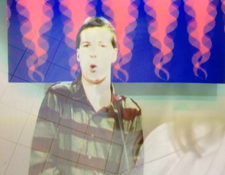 Well, there is a full collection of vocal-less instrumental-only mixes of the entire original album. You get a slew of demos and rehearsal sessions, too, including a fascinating “Tudor Barn Album Rehearsal” showing some of that fly-on-the-wall perspective which sheds light as to what went into the making of this album.
Well, there is a full collection of vocal-less instrumental-only mixes of the entire original album. You get a slew of demos and rehearsal sessions, too, including a fascinating “Tudor Barn Album Rehearsal” showing some of that fly-on-the-wall perspective which sheds light as to what went into the making of this album.
I honestly have only found one little relatively minor nit to report on this set in that we don’t seem to get an original audio-only mix of the single “Life Begins at the Hop.”
We do get the new stereo mix. We do get a new 5.1 mix. We do get an extended version that was a b-side somewhere back in the day. We do even get the nice video version of the tune.
Unless I somehow missed it in there — and if I did, I apologize up front — I’m not sure why the single mix of “Life Begins at the Hop” would be omitted, but I might speculate. Perhaps, since this was recorded in a separate first session from the rest of the album (remember, the song was only on the US LP versions, not the UK), maybe that master tape is missing or perhaps was damaged over the years.
Since they had the original multitracks and other versions to work with, clearly they decided to move forward with this reissue package, offering up other fine new fresh alternatives. It’s a very minor point but one I need to bring up given it is the first single from this new incarnation of the band, and one of the bands’ most beloved tunes. Four out of five studio versions (as well as numerous rehearsal and demo versions) ain’t too bad, ultimately, so I am not complaining here.
This Drums & Wires surround-sound series set is remarkable. We get to hear a classic and groundbreaking modern rock album with so much fresh perspective it’s almost like hearing it new for the first time.
If you are new to XTC, why do you need to hear this? Well, because it rocks and has some great fun songs on it. And, going back to my earlier comment about the album being influential, here you’ll discover the blueprint for the big rock sound that became the norm for a good portion of the ’80s (at least until the gated snare drum sound took over in the mid-’80s).
The Drums & Wires surround sound series reissue is essential. Get it.
